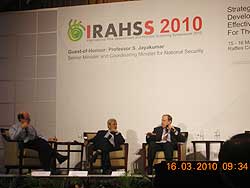News

In March 2010, the Singapore Prime Minister's Office invited Sundeep Waslekar and Ilmas Futehally of the Strategic Foresight Group for wide ranging interactions with various ministries and departments of the Government of Singapore.
The primary focus of the visit was the third International Risk Assessment and Horizon Scanning Symposium hosted by the National Security Coordination Secretariat. Addressing the Symposium, the SFG President pointed out that the population of the world would increase from 5.3 billion twenty years ago to 8.3 billion in twenty years from now. During this period people living in prosperity would increase from 2 to 5 billion. Yet the population living in the periphery would remain constant at 3.3 billion. He said that the greatest challenge of the next two decades was to bring prosperity to the periphery or else challenges such as terrorism, organised crime, pandemics and climate risk would spread from the periphery to the prosperous parts of the world. He argued that a collaborative and integrated model of global governance was required to meet interlinked challenges of the next two decades.
 Prof Clement Bezold, Director of the Institute for the Alternative Futures, also emphasised the need to apply futuristic thinking for the benefit of the poor of the world. He focussed on the need to introduce equity in the health sector and the implications of ageing in the developed world. He emphasised the need to create visionary scenarios in order to create a blueprint for the future. Prof William Halal, founder of TechCast, forecast that Artificial Intelligence would emerge as the most influential technology in the next decade or two. He stated that after the knowledge revolution, the world will see the revolution of human consciousness. Several other future experts participated in the symposium, including geopolitical experts who presented their assessments and technical experts who presented their tools for horizon scanning and risk mapping. The heads of scenario planning services in International Finance Corporation, OECD, World Economic Forum and EU presented their work. About 300 officials of government ministries and institutions in Singapore participated in the Symposium.
Prof Clement Bezold, Director of the Institute for the Alternative Futures, also emphasised the need to apply futuristic thinking for the benefit of the poor of the world. He focussed on the need to introduce equity in the health sector and the implications of ageing in the developed world. He emphasised the need to create visionary scenarios in order to create a blueprint for the future. Prof William Halal, founder of TechCast, forecast that Artificial Intelligence would emerge as the most influential technology in the next decade or two. He stated that after the knowledge revolution, the world will see the revolution of human consciousness. Several other future experts participated in the symposium, including geopolitical experts who presented their assessments and technical experts who presented their tools for horizon scanning and risk mapping. The heads of scenario planning services in International Finance Corporation, OECD, World Economic Forum and EU presented their work. About 300 officials of government ministries and institutions in Singapore participated in the Symposium.
The interaction between SFG and the Ministry of Home Affairs of Singapore focused on the SFG report An Inclusive World. The interaction was attended by senior functionaries, including Mr Khoo Boon Hui, Senior Deputy Secretary and President of the Interpol Executive Committee, and former Commissioner of Police of Singapore. The officials from Singapore expressed concern about regional threats of terrorism. They explained that Singapore had followed inclusive policies but a broader consensus was required in the Southeast Asian region.
SFG interacted with Mr Peter Ong Boon Kwee, Permanent Secretary of the Ministry of Finance and Ms Rachel Ho, a representative of the Public Utilities Board on future water security in Asia. The Ministry of Industry hosted a group discussion with young professionals in its Futures Group on the future of metropolis in Asia.
Mr Peter Ho, Cabinet Secretary and the Permanent Secretary of the Ministry of Foreign Affairs, is the architect of futuristic thinking in Singapore. He has demonstrated an outstanding vision in instilling futuristic thinking in the country, using advanced technical tools. SFG had the pleasure of informally interacting with Mr Ho on several occasions in the course of the visit.





